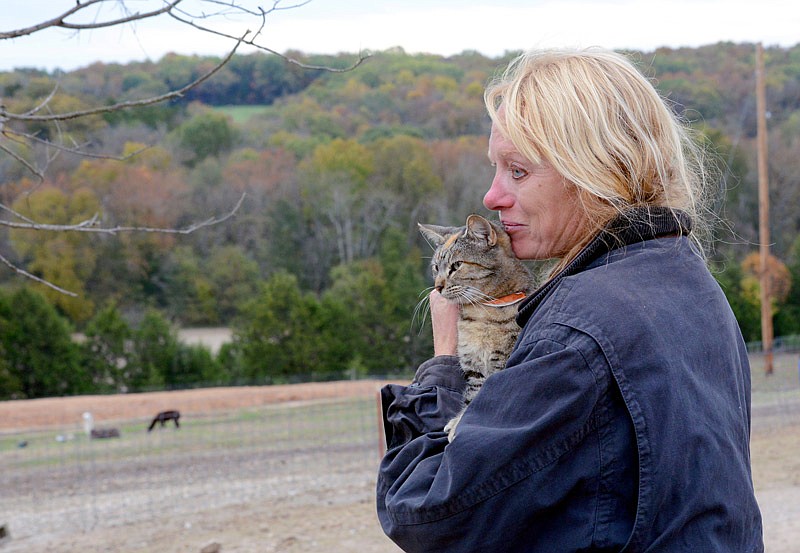After a monthlong argument with state officials over conditions in her petting zoo, the owner of a 62-acre farm and museum just east of Linn is shutting down the petting zoo and half of her business.
Cindy Brenneke owns Where Pigs Fly, a 62-acre farm and museum just east of Linn that lets visitors see, feed and pet free-roaming farm animals. Over the past month, Brenneke has been embroiled in a protracted argument with state regulators who said the farm's petting zoo does not comply with state standards governing animal shelters.
Brenneke made an agreement Oct. 17 with the Missouri Department of Agriculture to end the dispute by separating all animals from the museum exhibits, according to emails provided by Sami Jo Freeman, a spokeswoman for the Missouri Department of Agriculture. Brenneke also agreed to prevent public interaction with the animals, according to the emails.
Under the agreement, Brenneke said, she would prevent the public from seeing all farm animals, including dozens of cats that live in two shelters between the pig museum and a barn that houses a gift shop, by Dec. 9. Additional exhibits in the barn that house birds, ferrets and guinea pigs would also need to be removed or hidden, Brenneke said.
About 500 animals live on the farm, she said.
Matt Rold, Missouri Department of Agriculture animal care manager, told Brenneke that fencing must be in good repair, protect animals from injury, contain animals securely and restrict other animals from entering.
If Brenneke separates the animals from the museum exhibits and does not allow visitors to touch animals, the Agriculture Department would not have any more authority over Where Pigs Fly, Freeman said. In September, Freeman said the Agriculture Department does not care about, nor does it govern the Where Pigs Fly Pig Museum.
The Agriculture Department oversees petting zoos, animal exhibition spaces and animal shelters, Freeman told the News Tribune previously. Most of the animals on the Where Pigs Fly Farm will stay on the farm to live out their days, Brenneke said. Still, Brenneke said she would adopt out some animals, like cats, if she can find homes for them.
Where Pigs Fly fell under Missouri's Animal Care Facilities Act because it took in dogs or cats, adopted out dogs or cats, and harbored dogs or cats as a nonprofit, Freeman said. The farm also fell under the act because it charged a fee, in this case $3, to interact with cats and dogs.
State officials began an investigation after a Versailles woman filed a complaint over the living conditions on the farm, Freeman said. The woman told officials she had seen a horse with a gaping and oozing wound in its chest, grain sacks covered in flies and mold, and rodents living in muddy pens with chickens and pigs.
In September, state officials found at least 18 items non-compliant with state law governing animal shelters, according to an inspection report.
Cats and dogs in animal shelters must live on surfaces impervious to moisture, the report noted. The report noted two wooden sheds where cats lived had mostly wooden and concrete floors. Other animals were housed in outdoor recreation areas on dirt, the report said.
"Bare dirt cannot be properly cleaned and sanitized," the report stated.
Shelters for animals must be constructed so cats from outside the shelter can't get into the general population and infect them with diseases, the report said.
"It is not our intention in any way to shut her down," Freeman said in September. "This law is in place to ensure that any facility providing care to animals focuses on the health and well-being of the animals in their care."
During the inspections, state officials found numerous cats and dogs suffering from hair loss. Brenneke was told to isolate those animals from other parts of the general population.
As of last week, Brenneke appeared to comply with this regulation, stating one of the two sheds that houses cats only houses sick animals. Brenneke also said each cat or dog is spayed or neutered and each has a numbered collar to allow her veterinarian to keep health records for each animal.
Despite reaching the agreement with the state, Brenneke is miffed by what she perceives as the state's intrusion into her life.
In parts of the farm where cats cannot roam due to the agreement with the Agriculture Department, mice run rampant, Brenneke said.
"We really are a farm, and to cage cats would just be ridiculous," Brenneke said. "It'd be unfair to them to lock them up, and how do I control rodents?"
PREVIOUS COVERAGE

